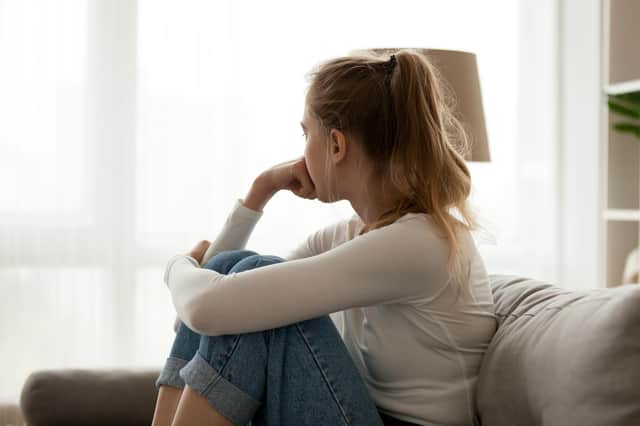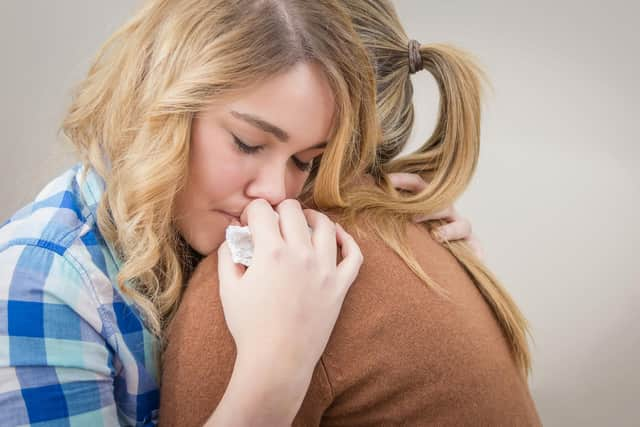Eating disorder charity offers advice on coping over Christmas as calls to helpline surge


Beat, the UK’s leading charity supporting those with eating disorders has been a surge in people contacting them throughout 2020, but calls to them are particularly high throughout the festive season.
Katie Reid, 22, is an ambassador for Beat, having lived experience of anorexia and was diagnosed with the illness at the age of 14.
Advertisement
Hide AdAdvertisement
Hide Ad“I remember the sheer panic I felt at Christmas,” she said, “I was diagnosed with anorexia just after the Christmas holidays when my mum took me to the GP.


“At Christmas time there is a real pressure on those with eating disorders - you’re supposed to be happy and if you’re not there;s something wrong. There was so much attention put on not being happy and questions about why you’re not eating or engaging.
“There’s not an allowance to be sad and I think that there is a lack of understanding of how to support people with eating disorders and it’s difficult to break out of.”
Katie, who lives in Fife and is studying a Masters in Applied Art in Social Practice has used her experience to help advise the Scottish Government in issues regarding body image and is using her lived experience to create awareness of eating disorders in a social context.
Advertisement
Hide AdAdvertisement
Hide Ad“When I was ill, my parents at the time didn’t understand how to help me, but when I started my recovery they started to learn and understand,” Katie added, “They were trying to help me, but it wasn’t in the right way.”
She added that the best way to support a loved one with an eating disorder is with patience.
For those living with an eating disorder, Christmas can be a difficult period due to disruption to their normal routine as well as increased focus on food.
The festive season can also see those who mean well to make triggering and unhelpful comments about food and weight.
Advertisement
Hide AdAdvertisement
Hide Ad“Beat have loads of articles and posts that are really helpful and have details on how to cope at Christmas and how to support people with eating disorders.” Katie added, “I think if my parents had gone to Beat they may have taken a different approach, and it can help families and loved ones understand as it is so hard to translate to someone the difficulties and complexities of the illness.”
Katie, who recovered in 2017 has urged those who may be struggling to reach out for help.
“The first step to getting help is the most horrendous thing,” she said, “but doing that will change everything for you.
“It was my mum who did it for me and the second she did it began a cycle of change.”
Advertisement
Hide AdAdvertisement
Hide AdIt is estimated that 1.25million people in the UK live with an eating disorder, the condition can affect anyone at any time, but girls and young women aged 12 to 20 are most at risk.
Studies suggest that up to 25 per cent of people with eating disorders could be male and the sooner someone gets the treatment and support they need, the more likely they are to make a full recovery.
Emma Broadhurst, Beat’s National Officer for Scotland said: “We’ve seen a huge demand in services this year, around two and a half times the amount of people than normal.
“Up until the end of October last year Beat had helped around 1000 people in Scotland, and the same period this year saw nearly 3000.
Advertisement
Hide AdAdvertisement
Hide Ad“Coronavirus has definitely had an impact, with people not being able to access resources, changes to routine, heightened anxiety levels and being around the house more.
“Beat adapted really quickly to get our services online, there is even a specific webchat called Sanctuary which is a space to switch off and not talk about Covid. Our helplines have also been open for longer.”
“Christmas is meant to be a joyful, special time but the focus around food and being social causes quite a bit of anxiety and the pressure to eat large amounts is triggering.
“Eating disorders are an isolating illness and with many people trying to hide their eating disorder, it can cause a lot of anxiety.”
Advertisement
Hide AdAdvertisement
Hide AdThe Beat website offers advice to those living with eating disorders and their families about how to cope at Christmas with suggestions including taking the focus and conversation away from food, leaving the table after dinner has been eaten and discussing a routine for how Christmas Day will be.
They suggest engaging with other aspects of Christmas which aren’t food related such as decorating, watching films and participating with games.
Emma added: “If you can, ahead of Christmas, start talking to family and loved ones about plans and how food will be involved. It’s important for people living with eating disorders to remember that it is okay not to stick to their normal routine for a couple of days, and loved ones can offer reassurance and be open and clear about what will happen.
“For people with eating disorders, allow them time away from the table if they are struggling and have a sign to say that, it’s best to catch it before the explosion happens.
Advertisement
Hide AdAdvertisement
Hide Ad“For carers it’s an understandably stressful time trying to keep everyone happy, but the Beat helpline is open every day for advice and online there is guidance on how to cope at Christmas.
“It’s also important to remember that you are not the only person living with this.”
Beat helplines are open 365 days a year from 9am until 8pm during the week, and 4pm until 8pm on weekends and bank holidays. They also have a dedicated one-to-one webchat.
There is online support for carers and for people living with eating disorders.
Advertisement
Hide AdAdvertisement
Hide AdThose wishing to make donations to the charity can do so online.
A message from the Editor:
Thank you for reading this article. We're more reliant on your support than ever as the shift in consumer habits brought about by coronavirus impacts our advertisers.
If you haven't already, please consider supporting our trusted, fact-checked journalism by taking out a digital subscription.
Comment Guidelines
National World encourages reader discussion on our stories. User feedback, insights and back-and-forth exchanges add a rich layer of context to reporting. Please review our Community Guidelines before commenting.